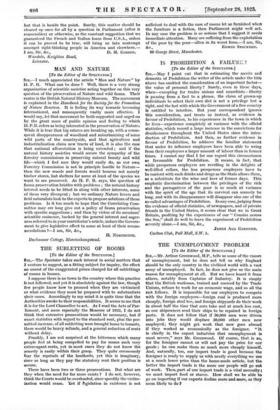IS PROHIBITION A FAILURE ? [To the Editor of the
SPECTATOR.] Sue—May I point -out that in estimating the merits and demerits of Prohibition the writer of the article under the title above has omitted the consideration of an important factor—. tbe value of personal liberty? Surely, even in these days, when—excepting for trades unions and anarchists—liberty is passing from a fact to a phrase, the claim of grown-up individuals to select their own diet is not a privilege but a right, and the last with which the Government of a free country Is entitled to interfere. But your correspondent ignores this consideration, and treats us instead, as evidence in favour of Prohibition, to his experiences in the town in which he lives—experience completely at variance with the official statistics, which record a large increase in the convictions for drunkenness throughout the United States since the intro- duction of Prohibition. And then, as further evidence in favour of Prohibition, he adduces the familiar statement that under its influence employers have been able to wring from their employees a larger amount of labour than in former times. I cannot say that I for one regard this circumstance as favourable for Prohibition. It means, in fact, that while prosperous employers are revelling in the delights of well-filled cellars, the less prosperous employers have to be content with such drinks and drugs as the State allows them, as a substitute for the wine and beer of former days. This emphatic discrimination between the privileges of the rich and the prerogatives of the poor is so much at variance with the spirit of the age that its survival can scarcely be long, and with its disappearance will disappear also one of the so-called advantages of Prohibition. In any case, judging from the evidence of official statistics, of newspapers, and of private friends in the United States, it seems clear that we in Great Britain, profiting by the experiences of our " Cousins across the Sea," shall do well to leave the experiment of Prohibition severely alone.—I am, Sir, &c.,
Carlton Club, Pall Mall, S.W.1.
.TAMES AGG GARDNER.


















































 Previous page
Previous page